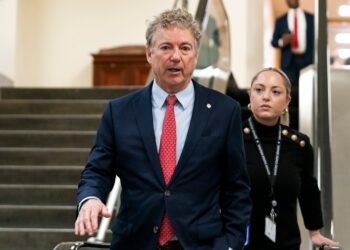Treasury Secretary Scott Bessent will skip a meeting of finance ministers and central bankers from the Group of 20 nations in Cape Town next week, according to people familiar with his plans, deepening the rift between the United States and South Africa over policies the Trump administration believes are anti-American.
The decision to forgo such a major economic gathering is highly unusual for a Treasury secretary, particularly one who was confirmed to his post three weeks ago. It comes at a pivotal moment for the global economy, as the United States moves toward imposing tariffs on virtually all of its trading partners. President Trump is also seeking deeper economic ties with Russia, an adversary that the United States was aligned against in coordination with Western allies until he returned to office.
Mr. Bessent’s decision came after a boycott of a similar meeting this week of foreign ministers in Johannesburg by Secretary of State Marco Rubio. Mr. Rubio said he was skipping the gathering because he did not want to “waste taxpayer money or coddle anti-Americanism.”
Mr. Trump has indicated that he sees little value in multilateral meetings like the Group of 20 and prefers to hold bilateral negotiations with other nations. The theme for the meetings this year is “solidarity, equality, sustainability,” which the administration considers at odds with its views on climate change and diversity policies.
The gathering would have been Mr. Bessent’s first opportunity to meet with his global counterparts and have talks with top financial officials from Europe, China and Russia.
Mark Sobel, who served at the Treasury Department for nearly four decades, called the decision to skip the meetings a “colossal mistake.” He noted that such gatherings were an opportunity for the Trump administration to lay out its global priorities and discuss the state of the world economy and central issues such as exchange rates.
“The Trump administration and Scott Bessent are thumbing their noses at the international economic and financial system,” Mr. Sobel said. “That will not make America greater or safer.”
The G20 was created in 1999 after the Asian Financial Crisis as a forum for finance ministers and central bankers to meet and discuss international economic matters and financial stability.
The group’s meetings have been awkward in recent years because of tension between Russia and Western allies, including the United States, over the war in Ukraine. But the Trump administration has made clear that it intends to take a different approach with Russia as it looks to negotiate an end to the war.
Mr. Trump suggested this week that Ukraine might have been responsible for Russia’s invasion and on Wednesday referred to the Ukrainian president, Volodymyr Zelensky, on social media as a “Dictator without Elections.”
The boycott by Mr. Bessent will come as a disappointment and a surprise to South Africa. An official from its Department of International Relations and Cooperation posted on social media this week that the Treasury secretary was expected to attend the meetings in Cape Town.
A spokeswoman for Ms. Bessent had no comment on Wednesday. Another person familiar with the situation said that Mr. Bessent was in regular contact with his international counterparts and opted to stay in the United States next week to focus on domestic matters.
The diplomatic tension between the United States and South Africa emerged as a surprising turn of events this year.
Earlier this month, Mr. Trump ordered that all foreign assistance to South Africa be halted and said his administration would prioritize the resettling of white, “Afrikaner refugees” into the United States because of what he called actions by the country’s government that “racially disfavored landowners.”
Mr. Trump’s recent comments were in reference to a policy that President Cyril Ramaphosa of South Africa signed into law last month.
Known as the Expropriation Act, the law repeals an apartheid-era policy and allows the government in certain instances to acquire privately held land in the public interest without paying compensation. This can be done only after a justification process subject to judicial review.







